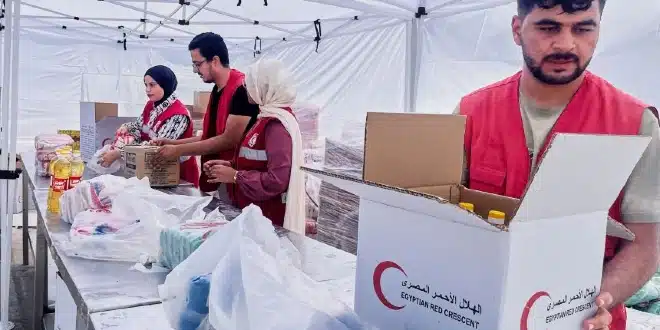Egypt’s Foreign Minister Badr Abdelatty has issued one of the country’s strongest warnings to date regarding the war in Gaza, declaring that any forced displacement of Palestinians across the border is a “red line” that will not be crossed. Speaking to CNN from the northern Egyptian city of Al-Arish, near the Gaza frontier, Abdelatty stressed that Cairo would never allow its sovereignty or national security to be undermined by external plans to relocate Palestinians.
“We will not accept it, we will not participate in it, and we will not allow it to happen,” Abdelatty said, warning that such a move would amount to a “one-way ticket” out of Gaza, effectively erasing the Palestinian cause.
Egypt, which controls Gaza’s only outlet not under Israeli blockade, has been under pressure from its own public to ease Palestinian suffering. Cairo has repeatedly criticized Israel for preventing humanitarian aid from entering the enclave, where thousands of trucks remain stranded on the Egyptian side of the border.
Rising Tensions Over Israel’s Post-War Vision
While Israel has not presented a detailed blueprint for Gaza’s future, Prime Minister Benjamin Netanyahu and senior members of his government have consistently floated the idea of resettling Palestinians in third countries. The notion, once raised by former U.S. President Donald Trump earlier this year, has continued to find backing among far-right ministers in Netanyahu’s cabinet, despite international objections.
Israeli officials have reportedly discussed potential relocation with several countries—including South Sudan, Somaliland, Ethiopia, Libya, and Indonesia—in exchange for financial and diplomatic incentives. Yet many of these governments have dismissed or distanced themselves from the reports. South Sudan flatly denied any such negotiations, while Indonesia clarified it would only temporarily host Palestinians for medical treatment before sending them back to Gaza.
Egypt, the first Arab country to sign a peace treaty with Israel in 1979, now finds itself at the center of the debate. Abdelatty cautioned that forced displacement could jeopardize long-standing agreements, warning that no party would be permitted to endanger Egypt’s borders or sovereignty.
No Partner for Peace
Abdelatty also voiced deep frustration with Israel’s political leadership, saying Cairo sees little interest in ending the war. “Unfortunately, we don’t have a partner in Israel right now for peace and the two-state solution,” he said, pointing to members of Netanyahu’s cabinet, such as National Security Minister Itamar Ben Gvir and Finance Minister Bezalel Smotrich, who openly reject Palestinian statehood.
Talks for a ceasefire and hostage exchange remain ongoing, with Cairo coordinating alongside Qatar, the United States, and Israel. Abdelatty noted that “a sort of understanding” had been reached on several elements of a U.S.-backed proposal, though Israel’s insistence on Hamas’s immediate disarmament remains, in his words, “an impossible demand” after nearly two years of heavy bombardment.
“We need to push now for a deal,” Abdelatty urged, confirming that a Hamas delegation is currently in Cairo. He emphasized that Egypt seeks a comprehensive agreement—ending hostilities, facilitating prisoner exchanges, and ensuring humanitarian aid flows into Gaza.
Humanitarian Bottleneck at Rafah
Meanwhile, the humanitarian crisis continues to worsen at Gaza’s gates. CNN reporters observed long queues of aid trucks at the Rafah crossing, many immobilized for weeks. Abdelatty said roughly 5,000 trucks were waiting to deliver essential supplies but remained blocked by Israeli authorities.
Truck drivers described spending days or weeks stranded at the border, with some reporting spoiled cargo after repeated rejections. “Once you’re here… you cannot leave,” one driver told CNN, highlighting the desperation felt by those caught in the standoff.
As the conflict grinds on, Egypt’s stance has become increasingly firm: while it will work through “different channels” to ease Palestinian suffering, it will not serve as a resettlement corridor. For Cairo, the displacement of Gaza’s population is not only a humanitarian catastrophe but also a threat to its national security and the future of the Palestinian cause itself.


